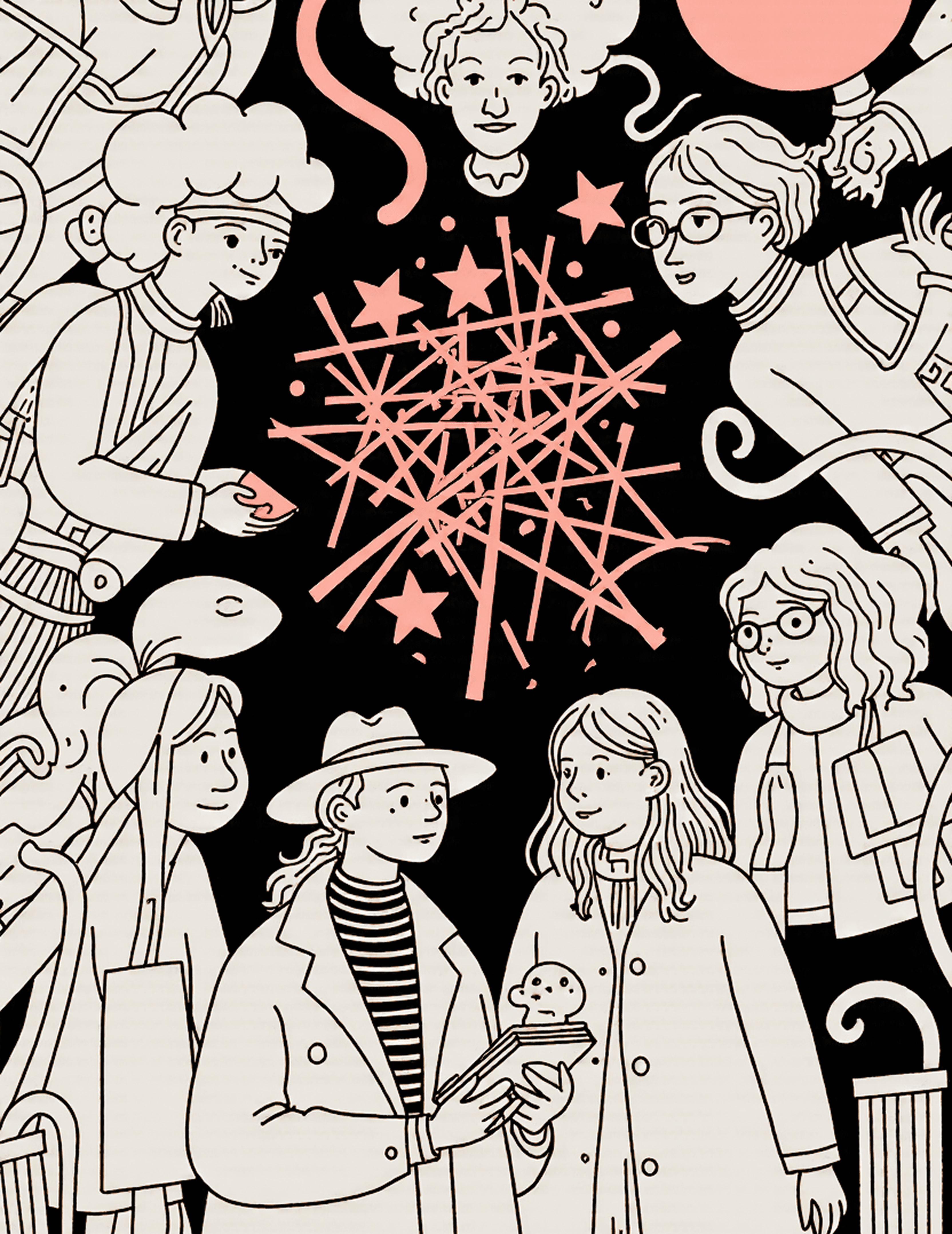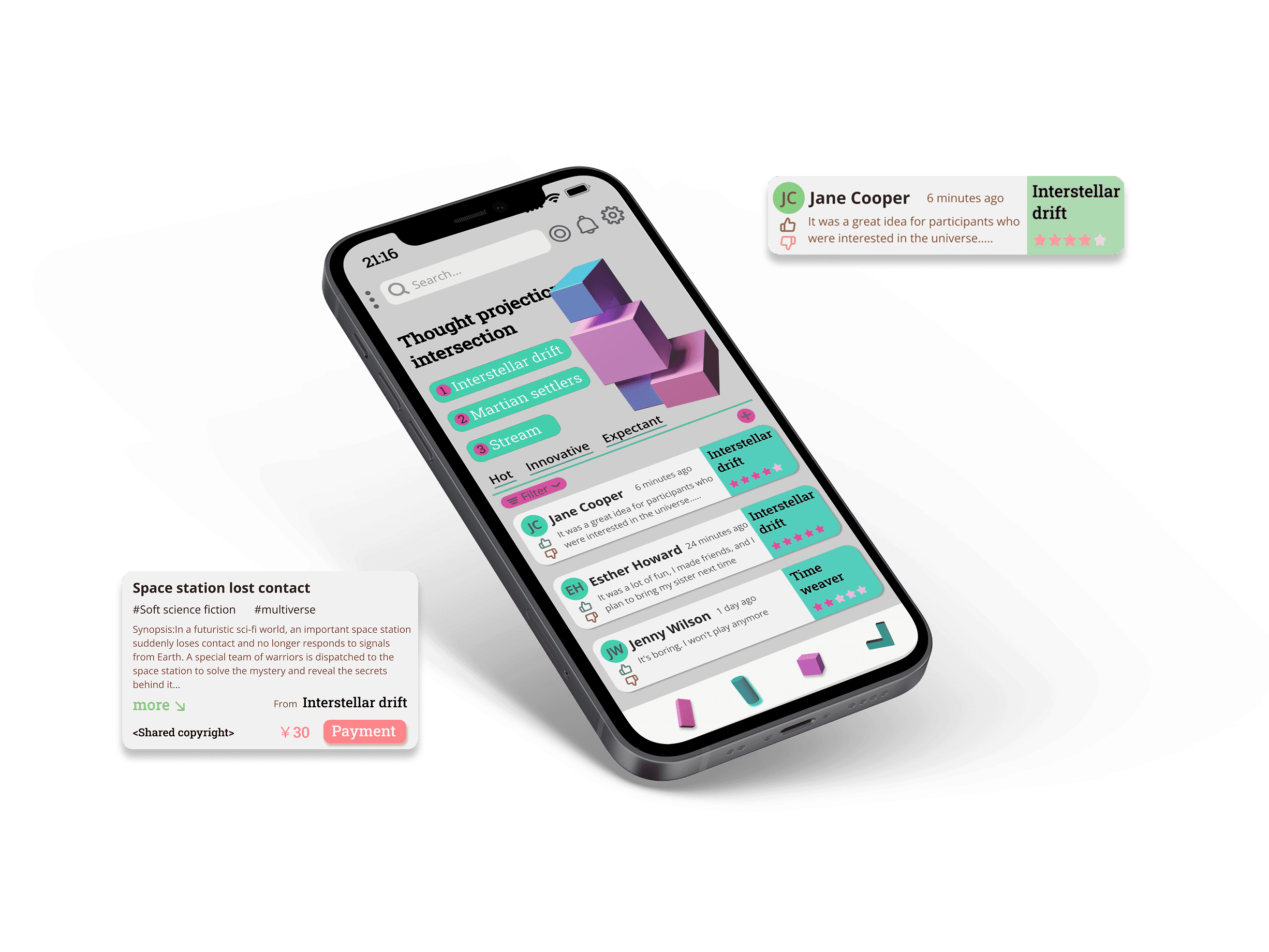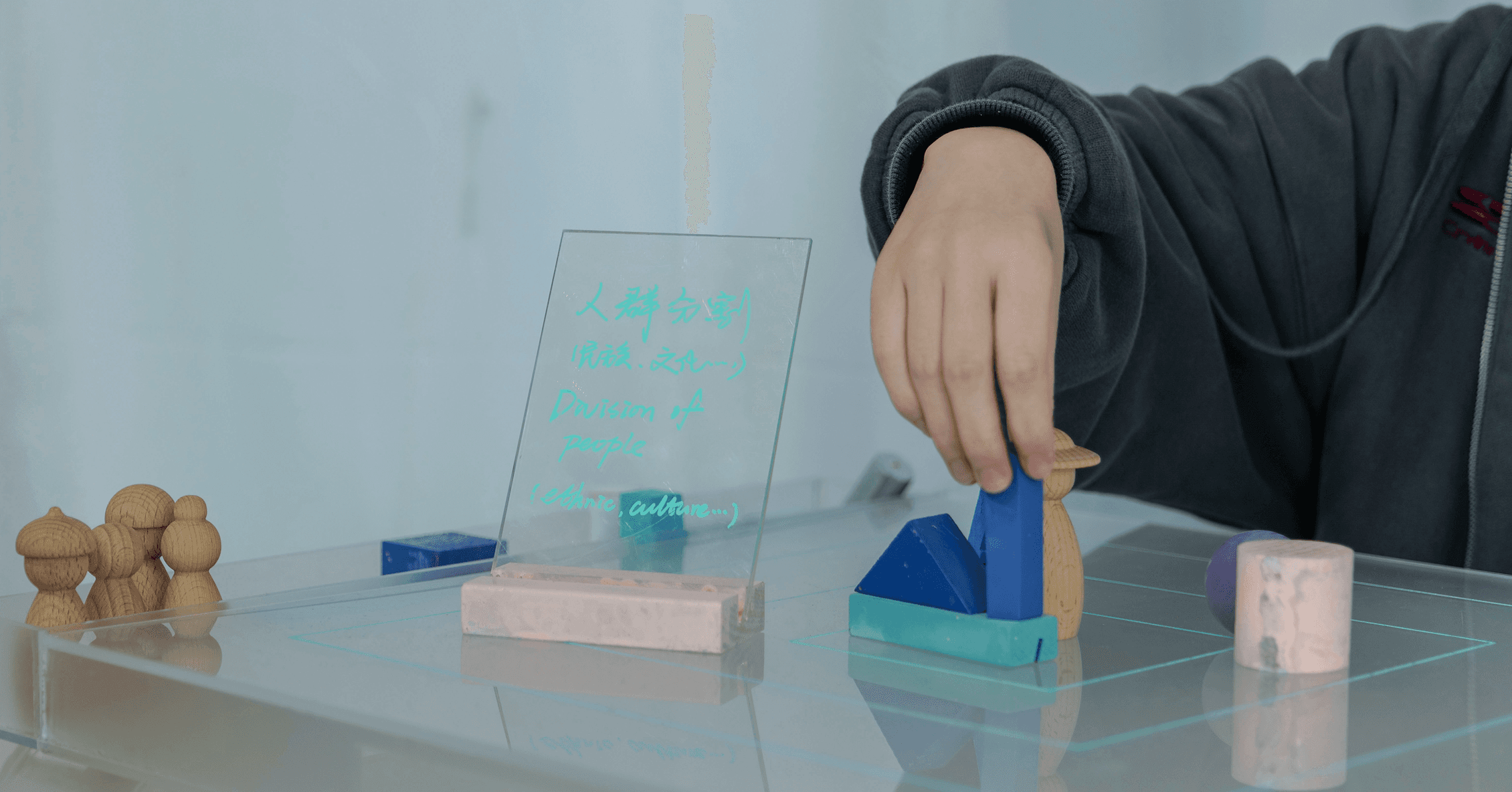
Designing Futures: A Collaborative Sci-Fi Service System
Designing Futures: A Collaborative Sci-Fi Service System
ABOUT
ABOUT
ABOUT
A service system that connects sci-fi authors and the public through a platform, sandbox, and idea cards—supporting co-creation, playful brainstorming, and IP protection
A service system that connects sci-fi authors and the public through a platform, sandbox, and idea cards—supporting co-creation, playful brainstorming, and IP protection
PROJECT
PROJECT
PROJECT
Location / Chengdu, China
Location / Chengdu, China
Location / Chengdu, China
Time / September, 2023
Time / September, 2023
Time / September, 2023
Service Design
Service Design
Service Design
Product Design
Product Design
Product Design
Methodology
Methodology
Methodology
Interaction Toolkit
Interaction Toolkit
Interaction Toolkit
Background
Background
Background
The Decline of Imagination in Contemporary Science Fiction
The Decline of Imagination in Contemporary Science Fiction
In an age dominated by AI tools and automated writing systems, science fiction risks losing its imaginative depth. Formulaic worldbuilding, reliance on templates, and a widening gap between science and daily life challenge authors’ creativity and readers’ engagement
In an age dominated by AI tools and automated writing systems, science fiction risks losing its imaginative depth. Formulaic worldbuilding, reliance on templates, and a widening gap between science and daily life challenge authors’ creativity and readers’ engagement
In an age dominated by AI tools and automated writing systems, science fiction risks losing its imaginative depth. Formulaic worldbuilding, reliance on templates, and a widening gap between science and daily life challenge authors’ creativity and readers’ engagement

Ready-made resources
Ready-made resources
Overly detailed templates
Overly detailed templates
Lack of adaptable outlines
Lack of adaptable outlines

Lacks inspiration and originality
Lacks inspiration and originality
Formulaic and dull plots
Formulaic and dull plots

Complex science knowledge
Complex science knowledge
AI-generated content
AI-generated content
Science fiction faces a stagnating creative ecosystem, where standardized templates, automated tools, and repetitive worldbuilding limit authors’ stylistic expression. As inspiration becomes rarer and scientific concepts grow more complex, narratives risk becoming predictable and disconnected from readers’ experiences
Science fiction faces a stagnating creative ecosystem, where standardized templates, automated tools, and repetitive worldbuilding limit authors’ stylistic expression. As inspiration becomes rarer and scientific concepts grow more complex, narratives risk becoming predictable and disconnected from readers’ experiences
Research
Research
Research
Exploring the Convergence of Sci-Fiction Writing and Service Design
Exploring the Convergence of Sci-Fiction Writing and Service Design
Through interviews with science fiction writers and analysis of Foresight Design methods, this phase maps the challenges at each writing stage. It reveals structural parallels between writing and design, providing a theoretical basis for tool-based interventions
Through interviews with science fiction writers and analysis of Foresight Design methods, this phase maps the challenges at each writing stage. It reveals structural parallels between writing and design, providing a theoretical basis for tool-based interventions
Through interviews with science fiction writers and analysis of Foresight Design methods, this phase maps the challenges at each writing stage. It reveals structural parallels between writing and design, providing a theoretical basis for tool-based interventions
“Collecting reference materials is like falling into a rabbit hole — it eats up so much of my time before I even start writing.”
“Collecting reference materials is like falling into a rabbit hole — it eats up so much of my time before I even start writing.”
“Collecting reference materials is like falling into a rabbit hole — it eats up so much of my time before I even start writing.”
“I often sit there staring at the screen, waiting for inspiration that just won’t come.”
“I often sit there staring at the screen, waiting for inspiration that just won’t come.”
“ I want feedback, but showing my unfinished work to others makes me feel exposed and uncomfortable.”
“ I want feedback, but showing my unfinished work to others makes me feel exposed and uncomfortable.”
Some science fiction authors were interviewed to explore their creative processes and the challenges they face at different stages of writing. The insights reveal patterns in how ideas are generated, refined, and structured throughout the writing process
Some science fiction authors were interviewed to explore their creative processes and the challenges they face at different stages of writing. The insights reveal patterns in how ideas are generated, refined, and structured throughout the writing process
Ⅰ
Ⅱ
Ⅲ
Ⅳ
Ⅴ
Hover to see steps
Hover to see steps
Four key inspiration points were identified in the sci-fi writing process: building foundational settings, refining worlds, constructing plots, and shaping characters. Future and Foresight Design methods were then reviewed and mapped to these stages to guide the development of new solutions
Four key inspiration points were identified in the sci-fi writing process: building foundational settings, refining worlds, constructing plots, and shaping characters. Future and Foresight Design methods were then reviewed and mapped to these stages to guide the development of new solutions
Design Toolkit Analysis
Design Toolkit Analysis
Iteration
Iteration
Iteration
Reframing Creativity and Imagination through the Use of Design Toolkits
Reframing Creativity and Imagination through the Use of Design Toolkits
Building on research, four key inspiration points are identified: worldbuilding foundations, refining settings, plot construction, and character shaping. Design toolkits are mapped onto these stages to spark creativity, with concepts inspired by participatory formats like Mystery Parties
Building on research, four key inspiration points are identified: worldbuilding foundations, refining settings, plot construction, and character shaping. Design toolkits are mapped onto these stages to spark creativity, with concepts inspired by participatory formats like Mystery Parties
Building on research, four key inspiration points are identified: worldbuilding foundations, refining settings, plot construction, and character shaping. Design toolkits are mapped onto these stages to spark creativity, with concepts inspired by participatory formats like Mystery Parties
How might we apply service design as a methodology to support Sci-Fiction authors in generating ideas and sustaining imaginative writing?
How might we apply service design as a methodology to support Sci-Fiction authors in generating ideas and sustaining imaginative writing?

Card-Based Medium
Card-Based Medium
Exploring imagination through cards that connect unrelated ideas, reflect on daily life, and spark foundational settings for worldbuilding
Exploring imagination through cards that connect unrelated ideas, reflect on daily life, and spark foundational settings for worldbuilding

Sensing Block-Based Medium
Sensing Block-Based Medium
Using themed blocks to refine settings, establish world outlines, and create diverse cultural, social, and historical contexts across time and space
Using themed blocks to refine settings, establish world outlines, and create diverse cultural, social, and historical contexts across time and space

Sensing Chessboard-Based Medium
Sensing Chessboard-Based Medium
Placing characters, conflicts, and events on a chessboard to refine plots and construct specific scenarios that drive dramatic storytelling
Placing characters, conflicts, and events on a chessboard to refine plots and construct specific scenarios that drive dramatic storytelling

Role-Playing
Role-Playing
Assigning roles to participants who extend dialogues, shape character images, and develop stories collaboratively from multiple perspectives
Assigning roles to participants who extend dialogues, shape character images, and develop stories collaboratively from multiple perspectives
A conceptual toolkit, inspired by the structure of Mystery Parties, mobilizes wider public participation to collectively spark imagination, generate innovative ideas, and provide tangible support for authors in shaping world-building, character development, and narrative construction within science fiction writing, with both authors and participants actively involved at each stage of the process
A conceptual toolkit, inspired by the structure of Mystery Parties, mobilizes wider public participation to collectively spark imagination, generate innovative ideas, and provide tangible support for authors in shaping world-building, character development, and narrative construction within science fiction writing, with both authors and participants actively involved at each stage of the process
Details
Details
Details
Building a Collaborative System for Collective Storymaking
Building a Collaborative System for Collective Storymaking
The proposed system combines an online application with an offline board game. Together, they form a collaborative service where the public co-creates with authors, offering inspiration, diverse content, and real-time feedback while safeguarding creative ownership
The proposed system combines an online application with an offline board game. Together, they form a collaborative service where the public co-creates with authors, offering inspiration, diverse content, and real-time feedback while safeguarding creative ownership
The proposed system combines an online application with an offline board game. Together, they form a collaborative service where the public co-creates with authors, offering inspiration, diverse content, and real-time feedback while safeguarding creative ownership


StoryBlocks: Creative Platform
StoryBlocks: Creative Platform
A structured co-creation platform for science fiction, supporting authors in world-building while enabling participants to contribute, gain recognition, and share intellectual property
A structured co-creation platform for science fiction, supporting authors in world-building while enabling participants to contribute, gain recognition, and share intellectual property
Hover to see two perspectives
Hover to see two perspectives
StoryBlocks: Play & Create
StoryBlocks: Play & Create
Combining chessboard, cards, and record tools, it offers an interactive team experience. RFID-enabled pieces transmit data to the app in real time, creating a unique virtual world, with each step guided and recorded by the app
Combining chessboard, cards, and record tools, it offers an interactive team experience. RFID-enabled pieces transmit data to the app in real time, creating a unique virtual world, with each step guided and recorded by the app
Hover to see materials
Hover to see materials

User Journey
User Journey

Behind the scenes
Behind the scenes
Behind the scenes
#Feedback
#Feedback
Two rounds of user testing show that non–sci-fi participants bring fresh ideas and incentives boost engagement, aiding the author’s creativity. Challenges include inconsistent output quality and risks from random teams. Improvements include clearer communication, transparent copyright and funding, and future VR/AR immersion
Two rounds of user testing show that non–sci-fi participants bring fresh ideas and incentives boost engagement, aiding the author’s creativity. Challenges include inconsistent output quality and risks from random teams. Improvements include clearer communication, transparent copyright and funding, and future VR/AR immersion








